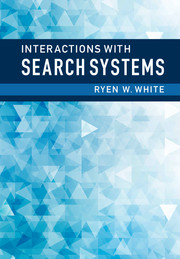14 - Call to Action
from Part IV - Opportunities and Challenges
Published online by Cambridge University Press: 05 March 2016
Summary
Opportunities and Challenges
The future is bright for search interaction. This chapter outlines some of the grand challenges for search interaction and present a call to action for the researchers and practitioners of search systems to work collaboratively to meet these challenges. The confluence of a number of important technological advances means that there is significant opportunity for the search community to advance the process of information seeking well beyond its current state. New interaction techniques, cloud-based storage, and mobile devices are some of the most important recent advances that need to be investigated more thoroughly by the research community when designing next-generation search systems. Some of the other notable recent advances, such as big data and machine learning, have led to significant advances in the development of support for the search process (Liu, 2009). The goals of search, both in terms of the core capabilities of search systems and searcher expectations for what these systems can do, need to be expanded beyond information finding (a facility that all search systems must possess) to promote the development of search technology to help people explore, learn, gain insights, and apply their knowledge. The remainder of this chapter outlines key opportunities presently available to the search community to shape the future of search interaction. These can be grouped into four categories: (1) experiences; (2) data; (3) evaluation; and (4) external engagement.
Development of search experiences
• Capitalize on new technologies and interaction paradigms. The pace of technological innovation is increasing rapidly. New devices are emerging that understand natural interactions such as touch, gesture, and voice, and can be used in many different settings. Although there has been some recent progress toward supporting the application of these new technologies in search interaction (see Hearst [2011] for a summary of some recent advances), research in the area of natural user information retrieval (NUIR) is still in its infancy. Despite the importance and growing prevalence of devices and applications with new capabilities, the research community is largely still fixated on supporting desktop-based Web searching, with the keyboard and the mouse as the only input mechanisms, and textual query statements and a ranked list of search results as the primary means of engaging with search systems. Although interest in search across different types of devices is growing (Montañez et al., 2014), little attention has been paid to new modalities.
- Type
- Chapter
- Information
- Interactions with Search Systems , pp. 405 - 410Publisher: Cambridge University PressPrint publication year: 2016



